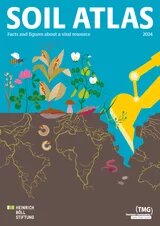
The phenomenon of large companies and investors buying up vast tracts of arable land in the Global South has long been seen as a problem. In Germany, too, this kind of land grabbing is on the rise, with small and medium-sized farms pushed out. A reorientation that prioritises the common good is needed.

For years, the land market in Germany has had a similar dynamic to the housing market: rising prices and the concentration of resources in ever fewer hands. Now, the two markets increasingly overlap. Take for example the sale of Röderland, an agricultural enterprise in the eastern state of Brandenburg, south of Berlin. A farmer was willing to pay 8 million euros for Röderland’s holding of approximately 2,500 hectares, but was outbid by Quarterback Immobilien, a property developer that plans to install a photovoltaic plant on part of the land. Quarterback is 40 percent owned by Deutsche Wohnen, a property management firm that merged with real-estate multinational Vonovia in 2021. Together, these companies own around 10 percent of all rental accommodation in Berlin and over 550,000 apartments throughout Germany.
A further similarity between the two markets is their lack of transparency. Ownership structures and corporate interdependencies are rarely recorded by the authorities or in public databases. Moreover, share deals are poorly regulated in both markets: buyers benefit from legal loopholes and can avoid the land transfer taxes they would incur when buying property or land directly.
Land purchases by investors outside the farming sector are far more common in eastern Germany than in the west. Investors such as Munich Re (an insurance company), the Lukas Foundation (part-owners of the Aldi retail chain) and the Gustav Zech Foundation (part of a major property development group) have bought up farms and leased land across eastern Germany over the last 15 years. The differences in the land markets in eastern versus western Germany are due to structures that have evolved over time in each region. Under the collectivization policy of the former East Germany (GDR), private farms were merged – often forcibly – into large agricultural cooperatives. After 1990, these collectives were generally transformed into companies under West German law, such as limited liability companies (GmbH), registered cooperatives (eG) or joint stock corporations (AG). These companies now control around 50 percent of all agricultural land in eastern Germany. Because of this history, farm enterprises in the east are on average significantly larger than in the west – and the larger the farm, the more attractive it is for investors and industrial agriculture. Small and medium-sized farms, on the other hand, lack the financial means to buy up large tracts of land.
Since 1962, the Land Transfer Act has enshrined a right of first refusal for leaseholders of agricultural land. This is based on the idea that agricultural land should belong to those who work it, and should be distributed among as many people as possible. A scenario in which a farm might be owned by a legal entity rather than an individual was not considered at the time. Today, share deals often mean that firms buy shares in a farm enterprise, giving them access to the land. Because the land was purchased indirectly, the right of first refusal for agricultural businesses and the notification requirement can be avoided. Revising the relevant laws would close these loopholes, first by recording and second by regulating the purchase of shares. This could act as a brake on rising land prices. Several of the federal states in eastern Germany are currently working on laws to this effect. More transparency and better regulation of investors and land prices could also be achieved at the level of the European Union (EU) through an EU-wide land observatory and European land directive. However, both projects are still in their infancy.
Another lever to ensure that more farmers have access to land is the idea of a progressive land transfer tax. This would mean that smaller enterprises pay no, or lower, land transfer tax – in contrast to those with large property portfolios.
Organisations that serve the common good, such as Kulturland-Genossenschaft and Ackersyndikat – both associations that buy land and hold it in trust – aim to ensure that smaller farm enterprises can access land despite high prices. They purchase land in close collaboration with the farmers, then make this available to them at the lowest possible leasehold rates. These and similar initiatives could pave the way to rethink how land is allocated to serve the common good. After all, land, like water, is a core basis of existence for people around the world and must be protected and shared. AbL, an association of conventional and organic producers on small and medium-sized farms, has developed a catalogue of criteria that can help ensure that land does not merely become a commodity concentrated in the hands of a few large investors. Among these criteria is the stipulation that the determining factor in the sale of agricultural land should not be the highest bid, but rather the type of intended cultivation. This would favour farm enterprises that pursue soil conservation, promote biodiversity, and protect the climate.


